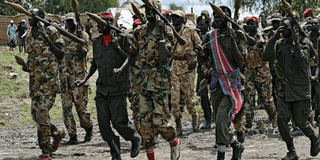Hopelessness in Juba camps as South Sudan marks two years of brutal war

Members of the South Sudan Democratic Movement Army (SSDM/A) faction march in Gumuruk on May 13, 2014. Two years since conflict in the country started, more than 185,000 people are still sheltering inside UN camps across the country as the bloodshed shows no sign of stopping despite several promises made on paper. PHOTO | SAMIR BOL |
What you need to know:
- Two years later after civil war broke out in South Sudan more than 185,000 people are still sheltering inside UN camps across the country, still too frightened to leave.
- In Juba, many of those in the camps are from the country’s second biggest ethnic group, the Nuer, who were among the first to be targeted as troops loyal to President Salva Kiir, a Dinka, fought it out with those allied to his ousted deputy Riek Machar, a Nuer.
- UN Secretary-General Ban Ki-moon last month warned that the broken ceasefire and failure to meet deadlines cast doubt on the parties’ commitment to the peace process.
- An African Union report - which listed a string of abuses, including forced cannibalism and dismemberment - gave little credence to Kiir’s claim that the war was a coup plot, and included testimony that ethnic violence had been planned.
JUBA, Tuesday
They came for a night fleeing fighting, hammering on the gates of the United Nations base as gunmen rampaged through South Sudan’s capital killing and looting.
Two years later, more than 185,000 people are sheltering inside UN camps across the country, still too frightened to leave.
“There is no freedom,” said Bong Kubuong, 39, a father of three and one of the 27,000 people living inside two camps in Juba, miserable but safe from a war marked by atrocities, including ethnic massacres, gang rapes and accusations of forced cannibalism.
“We stay here with the hope that one day things will change,” he said, describing how he spends days walking in circles around the camp fence.
“You can stroll around within the camp parameter but without getting out because you can be killed.”
ETHNIC VIOLENCE
In Juba, many of those in the camps are from the country’s second biggest ethnic group, the Nuer, who were among the first to be targeted as troops loyal to President Salva Kiir, a Dinka, fought it out with those allied to his ousted deputy Riek Machar, a Nuer.
“They were looking from door to door and when they found you are a Nuer, they would kill you,” said Deng Diang Chuol, sitting in the crowded camp in Juba, remembering how the war began on December 15, 2013.
Officially there is peace after an August deal - at least the eighth ceasefire agreed upon.
But fighting and active recruitment of armies of child soldiers continues.
UN Secretary-General Ban Ki-moon last month warned that the broken ceasefire and failure to meet deadlines cast doubt on the parties’ commitment to the peace process.
Both sides are accused of having perpetrated ethnic massacres, recruited and killed children and carried out widespread rape, torture and displacement of populations to “cleanse” areas of their opponents.
“By this time, we expected to be out of the camp but we cannot do that because we are afraid,” said 37-year-old Chuol who lives in the camp with his son.
“Our hopes are slim. This is a peace agreement on paper. There is no indication of implementation.”
LACK OF POLITICAL WILL
The army and rebels have repeatedly accused each other of breaking the internationally-brokered ceasefire, and the key deadline last month for Machar to return to Juba was missed.
“What has been put down on paper can only be a reality when leaders show political will to implement the deal and stop subjecting innocent South Sudanese to suffering,” said Edmund Yakani, a Juba activist.
Some estimate that 50,000 have been killed, including reports of children tossed into fires, but no record has been kept.
Civil war began when Kiir accused Machar of planning a coup, setting off a cycle of retaliatory killings that have split the poverty-stricken country along ethnic lines.
An African Union report - which listed a string of abuses, including forced cannibalism and dismemberment - gave little credence to Kiir’s claim that the war was a coup plot, and included testimony that ethnic violence had been planned.
About 2.3 million people have since fled their homes.





